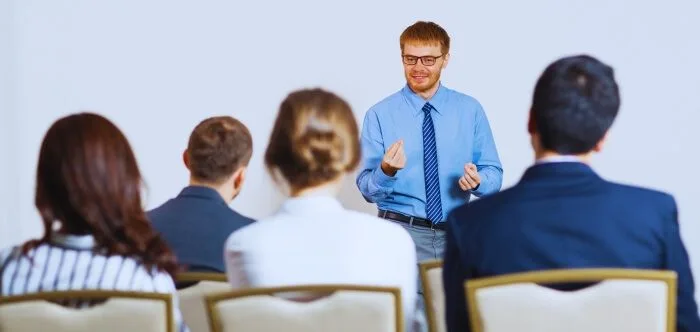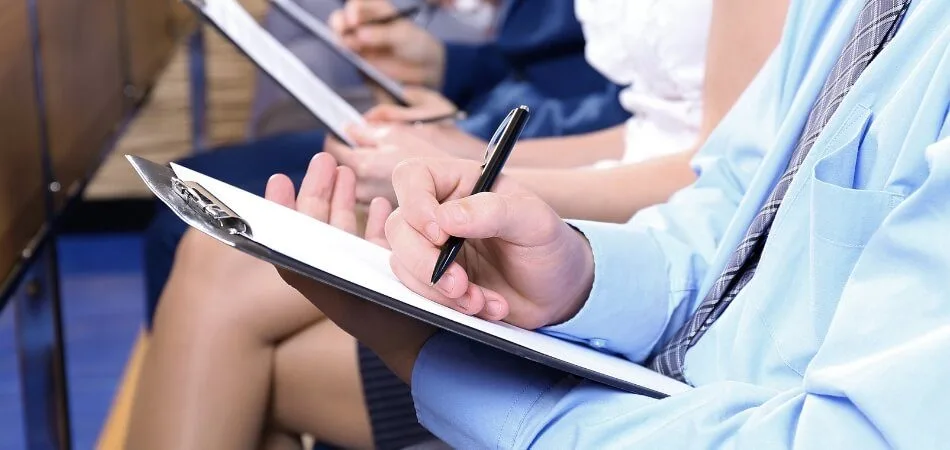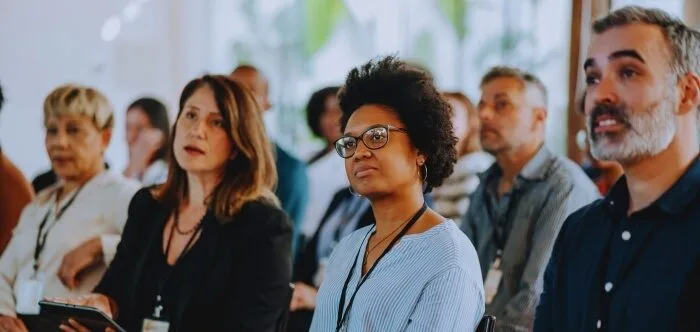Conferences are an effective treasure of knowledge, points of view, and networking possibilities for professionals. But with so much valuable content being shared, the question arises: Why is it important to take notes during a conference?”
Taking notes during a conference is crucial because it helps you focus, organize complex information, and reinforce learning. You can memorize important details and create a personalized record by actively engaging with the material and writing down key points. This simple practice ensures you gain the best insights from the event.
If you’re curious about the importance of taking notes during a conference, keep reading. This article will provide all the necessary information to help you understand how note-taking can improve your conference experience and make the most of the knowledge shared.
What is the Purpose of a Conference Session?
A conference session focuses on a specific topic within a larger event, facilitating learning and discussion. These sessions often include presentations, workshops, or panels led by experts in the field. They aim to offer attendees insights into the latest trends, research, and developments.
Attending these sessions allows participants to deepen their understanding of particular subjects. Whether it’s a new technique, emerging technology, or a significant study, these sessions are valuable for staying updated. They also provide an opportunity to ask questions and engage with experts, enhancing the learning experience.
One of the main purposes of conference sessions is sharing knowledge gained from conferences with a broader audience. Participants can apply what they learn in their work and share it with colleagues who were unable to attend. This helps spread valuable insights and promotes continuous learning within a professional community.
During conference sessions, you don’t just receive information. You also have the opportunity to network. Attendees can connect with like-minded individuals, share their perspectives, and discuss their experiences. In the long run, these interactions can lead to new ideas, collaborations, and professional relationships.
Types of Conference Sessions You Can Attend?
There is a wide range of topics and topics of interest available to conference attendees during conference sessions. Here are some common types of conference sessions you can attend.
Keynote Speeches and Expert Panels
A conference’s keynote speeches and expert panels are often its highlights. These sessions usually feature well-known industry leaders who share their expertise on important topics. Attending these sessions allows participants to gain high-level insights and stay informed about the latest trends and developments in their field.
Panel Discussions
It is our goal to bring together a variety of experts to create interactive discussions. By bringing together a wide range of perspectives, attendees can gain a more accurate understanding of complex issues or upcoming trends in the industry through the collaboration of multiple perspectives.
Interactive Workshops and Breakout Sessions
Hands-on learning is offered through interactive workshops and breakout sessions. These sessions are typically small and focus on specific skills or topics. Participants can actively engage, ask questions, and work to solve problems in a collaborative setting, making these sessions highly beneficial for practical learning.
Student-Focused Sessions
Conferences often include sessions specifically designed for students. These might focus on career development, research opportunities, or networking tips. For students, the advantages of attending conferences for students are significant, as they gain introductions to new ideas, meet potential mentors, and learn how to manage their future careers effectively. These sessions provide valuable opportunities for growth and learning.
Networking and Collaboration Opportunities
Besides formal sessions, conferences also provide plenty of opportunities for networking and collaboration. Informal gatherings, social events, and even breaks between sessions are excellent times to connect with other attendees. Building these relationships can lead to future collaborations and open doors to new opportunities in your field.
You can increase your experience and expand your knowledge by attending a variety of conference sessions. Engaging with different formats, such as workshops and keynote speeches, allows you to learn from experts and connect with peers, improving both personal and professional growth.
Why Is it Important to Take Notes During a Conference?
Taking part in a conference can be a valuable experience, filled with new information, ideas, and opportunities. However, with so much happening at once, it’s easy to forget key details. This is where taking notes comes into play, helping you capture and recall the important insights. For more information, here are the details:
Increasing Focus and Engagement
You can stay focused on the content being presented by taking notes during a conference. By actively listening and writing down key points, you stay engaged with the material. This active participation ensures that you absorb the information more effectively and stay connected to the discussion.
Organizing Complex Information
Conferences often present complex topics and a large amount of information in a short time. Taking notes allows you to organize this information in a way that makes sense to you. By breaking down and summarizing key points, you create a clear and structured record that is easier to review later.
Boosting Learning and Memory
The act of writing down information helps to improve learning and assist in memory recall. When you take notes, you process the material more deeply, which helps keep it in your memory. This makes it easier to recall important details long after the conference has ended, enhancing your overall learning experience.
Encouraging Active Participation
Note-taking encourages active participation in conference sessions. When you focus on capturing the important points, you are more engaged with the speaker and the content. This active involvement leads to a deeper understanding of the material, making your conference experience more meaningful and productive.
Facilitating Knowledge Sharing
Your notes can be an excellent tool for sharing knowledge with colleagues who could not attend the conference. By providing a summary of the key takeaways, you spread valuable insights throughout your organization. This collaborative effort increases the overall impact of the conference and contributes to team learning.
Creating a Personalized Record
By taking notes, you create a personalized record of the event. These notes not only help you remember what was discussed but also highlight the benefits of taking notes in a conference, as they serve as a valuable resource for future reference. This personalized documentation can be incredibly useful when you need to apply your knowledge.
Supporting Future Application
The ability to apply what you’ve learned during a conference is also increased when you take notes during the conference. By documenting the main ideas and practical tips, you have a resource that can guide you in implementing new strategies or techniques in your work. This ensures that the benefits of attending the conference extend beyond the event itself.
Taking notes during a conference is a simple yet powerful way to improve your learning and ensure you get the most out of the experience. By staying engaged, organizing information, and creating a valuable resource for future reference, you make the conference experience truly impactful.
How to Take Notes During a Conference?
It can be challenging to attend a conference due to the wealth of information presented. Effective note-taking is key to maximizing attendance benefits. Here’s a step-by-step guide to help you with this process:
Step 1: Choose the Right Tools
Select a note-taking method that suits your style. Digital tools like laptops or tablets are great for fast typers and offer cloud syncing, while traditional pen and paper can be less distracting and help with better learning.
Step 2: Prepare in Advance
Before the event, review the agenda to identify key sessions. Research the topics and speakers to frame your notes in context. This preparation can help you anticipate the type of information that will be most relevant and important to your needs.
Step 3: Listen Actively and Summarize
Engage fully with the speaker, focusing on understanding the essence of the presentation. Avoid copying everything; instead, summarize the main ideas in your own words. This not only helps in understanding but also makes your notes more personalized and easier to recall.
Step 4: Use Abbreviations and Symbols
Develop a personal note-taking system. Use abbreviations for common terms and symbols to represent key concepts. This approach saves time and keeps your notes to the point, ensuring you don’t miss important points in fast-paced presentations.
Step 5: Highlight Action Items and Questions
Make your notes actionable by clearly marking follow-up tasks, potential leads, or queries. Use different colors or symbols to differentiate these from general information. This practice makes it easier to identify the next steps post-conference.
Step 6: Review and Organize Post-Session
Spend a few minutes reviewing your notes after each session. Organize them into categories or themes for easier reference later. This review process not only strengthens your understanding but also helps in identifying any gaps or areas for further inquiry.
Step 7: Share and Reflect
Let your colleagues and peers know about your insights. Discussing and reflecting on your notes with others can provide new perspectives and deepen your understanding. This collaborative approach can also help with networking and knowledge exchange.
It is important to remember that effective note-taking is a skill that improves with practice, so adapt these steps to suit your style and watch how they will enhance your conference experience.
Tips to Avoid Common Mistakes in Conference Note-Taking
Effective note-taking at conferences can significantly improve your learning experience, but it’s easy to fall into common mistakes. To make the most out of these events, avoiding these mistakes is as important as the note-taking itself. Here are some essential tips to help you manage this process more effectively:
- Don’t Try to Write Everything Down: Focus on key points and ideas, rather than transcribing verbatim. This approach prevents information overload and keeps your notes concise and meaningful.
- Avoid Using Unfamiliar Terms: Stick to abbreviations and symbols you’re familiar with. Using unfamiliar terms can lead to confusion when reviewing your notes later.
- Resist the Push to Multitask: Trying to do multiple things, like checking emails, can lead to missed information. Stay focused on the presentation to capture essential details.
- Don’t Ignore Speaker’s Context: Pay attention to the speaker’s context and examples. They often provide valuable insights that improve the understanding of key points.
- Avoid Delayed Review of Notes: Take a moment to review your notes after the session. This helps solidify your understanding and clarifies any confusing parts.
- Keep Clear of Over-formatting in Real-time: Avoid spending too much time formatting your notes during the session. To maintain focus, keep formatting simple.
- Don’t Forget to Mark Action Items: Identify actionable items or follow-up points. This ensures that critical tasks or questions don’t get lost in the mass of information.
When you avoid these common mistakes, you’ll have your notes ready for review and application after the conference, ensuring that they will be an invaluable resource in the future.
Frequently Asked Questions
Taking notes during a conference is crucial for maximizing learning and retention. Below are some frequently asked questions and their answers to help you understand the importance of this practice and how it can improve your overall conference experience.
What Should You Focus On When Taking Notes at a Conference?
During a conference, pay attention to the key points and main ideas presented by speakers. Summarize complex information in your own words and highlight actionable items that you can put into practice. This will ensure that your notes will clearly convey the information and will be reviewed later on.
How Can Note-Taking Improve Your Engagement During a Conference?
It is easier to understand the material if you take notes because taking notes requires active listening, which enables you to stay engaged in the material. By taking notes, you can better understand what is being discussed. This active participation allows you to gain a deeper understanding of the subject matter at hand.
What Are the Benefits of Reviewing Notes After a Conference?
You can confirm the information you learned at a conference by reviewing your notes after the meeting. It provides an opportunity to organize your thoughts, identify gaps in your understanding, and prepare for implementing new ideas or strategies. This review process also makes it easier to share insights with others.
How Does Note-Taking Help with Future Conference Content Applications?
Taking notes during a conference allows you to document key ideas and practical tips, which can be referred back to when applying the knowledge to your work. This ensures that the valuable insights gained during the conference have a lasting impact and are effectively utilized.
Why Is It Important to Personalize Your Conference Notes?
By using your own words and structure, you can make your conference notes more relevant to your needs. It improves your understanding and memorizing of the material, making it easier to recall and apply the information in your professional or academic endeavors.
Conclusion
When attending a conference, taking notes is essential for capturing key insights, staying focused, and retaining useful information. Taking notes and actively engaging with the material ensures that the knowledge gained is easily accessible and applicable. This practice answers the question, “Why is it important to take notes during a conference?” by showing how it contributes to your learning and professional growth.
Remember to choose the right tools, summarize key points, and review your notes afterward as you prepare for your next conference. These simple steps will help you make the most of the experience. Best wishes as you apply these tips and maximize the benefits of your conference attendance!








